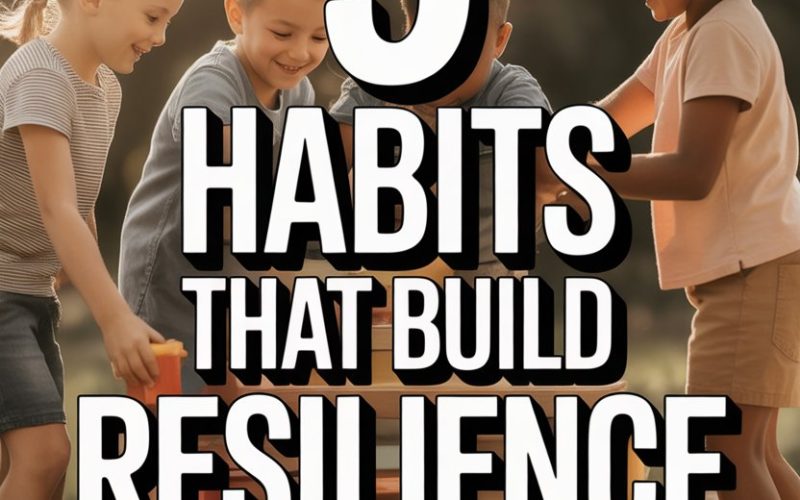Got a kid who falls apart if their sandwich is cut the “wrong” way? Welcome to the club!
Resilience—aka that magical inner bounce-back ability—can seem a bit like a unicorn when you’re mopping up from the latest tears.
The good news: resilience isn’t some rare gift from the fairy godparents; it’s built through everyday habits, and yes, even busy parents can help kids develop it.
No need to move to the mountains or start every day with a sunrise yoga session. Promise.
Ready to see which habits make the difference? Let’s get cracking.
1. Encouraging Problem-Solving, Not Solving Problems for Them
It’s tempting, isn’t it? The minute your child faces a hiccup—lost shoes, maths conundrum, epic LEGO catastrophe—you swoop in faster than a caffeinated superhero.
Yet, stepping in too quickly can rob kids of a chance to work out solutions for themselves.
Next time you spot those furrowed brows, hang back a second. Ask questions like, “What do you think we could try?” or “How might you fix this?”
Instead of offering up the answer on a silver platter, let them wrestle with choices and consequences. It’s a little like giving them training wheels for life’s inevitable wobbles.
Research from the University of Washington found that when kids are allowed to face manageable challenges—and even fail sometimes—they build up a ‘grit muscle’ that helps them tackle bigger obstacles later.
Sure, you might have to accept the mismatched socks or the slightly lopsided school project, but you’re raising someone who knows how to pick themselves up after a tumble.
2. Teaching Emotional Vocabulary (Even When You’re Tired)
Ever tried coaxing a grumpy five-year-old into telling you what’s wrong, only to receive a dramatic wail or a mumbled “I dunno”? It’s tough to process big feelings when you don’t even have the words.
Building resilience starts with helping kids name and talk about their emotions. Try using picture books or simple daily check-ins (“How did you feel when Jamie took your toy?”) to model honest conversations about feelings.
A study from the Yale Center for Emotional Intelligence revealed that children who can identify and articulate emotions are more likely to develop coping strategies that stick.
If your kid’s vocabulary is limited to “happy,” “sad,” and “hungry” (relatable), share your own feelings out loud—even the messy ones. “I’m disappointed that it’s raining and we can’t go to the park. I feel a bit cross!”
Watch as your child slowly picks up the language and the confidence to use it. Bonus: it just might cut down on the mysterious tantrums during the witching hour.
3. Modelling Imperfection and Self-Compassion
Perfection is about as realistic as a unicorn running for Parliament. Kids need to see that everyone—yes, even their all-knowing parents—messes up sometimes.
When you burn the toast, forget the spelling test, or send your child to school in last year’s too-small jumper, own it with a laugh. “Whoops, Mum goofed. Good thing we can try again tomorrow!”
This shows kids that mistakes are not the end of the world, but simply a part of being human.
Psychologist Dr. Kristin Neff’s work on self-compassion highlights that when parents model forgiveness for their own slip-ups, children are more likely to be kind to themselves after a setback.
Try swapping “I’m so stupid!” with “That didn’t go as planned. I’ll figure it out.” You’re giving your child permission to be imperfect and resilient, rather than brittle and anxious.
4. Building Everyday Routines and Predictability
Chaos might fuel creativity, but it doesn’t do much for resilience. In uncertain moments, children lean on routines for comfort and security—knowing what comes next helps reduce anxiety.
Simple habits like a bedtime ritual (yes, even if it’s just “brush teeth, cuddle, attempt to read three books, collapse”) and regular family meals give children safe anchors in their day.
These routines act as little islands of predictability in a world full of surprises.
Research from the American Academy of Pediatrics points out that kids with consistent routines are better equipped to handle stress and transition.
They learn that while life can be unpredictable, some things stay steady—like love, dinner at six, and the world’s most persistent bedtime negotiations.
Even if your schedule looks like a Jackson Pollock painting, aim for a few rituals you can stick to: Friday night pizza, Saturday lie-in, or a bedtime joke.
Life won’t always go according to plan, but the rhythm helps kids feel prepared to weather whatever comes.
5. Praising Effort Over Outcome
Gold stars and trophies are lovely (and an occasional bribe never hurt anyone), but focusing on the effort behind achievements sends a more powerful message than celebrating only the wins.
The now-famous research by psychologist Carol Dweck points out that children praised for effort—“You worked hard on that!”—develop a “growth mindset.”
They become more willing to try new things, bounce back from failure, and view challenges as opportunities rather than threats.
This doesn’t mean you have to throw a parade every time they put away their socks (though if you do, please share videos). It’s about highlighting persistence, creativity, and grit.
When your child struggles with a puzzle and keeps at it, acknowledge the effort: “You didn’t give up, even when it was tricky. That’s brilliant!” Watch as they begin to value progress over perfection.
A word to the wise: this habit works wonders for parents, too. Notice your own efforts, and let your kids see you try, stumble, and try again.
Raising Resilient Kids Without Losing Your Mind
No one said building resilience would be tidy. Sometimes it looks like a kitchen floor covered in flour or a science project gone explosively wrong.
Yet, these five habits—encouraging problem-solving, teaching emotional vocabulary, modelling imperfection, sticking to routines, and praising effort—lay the foundation for kids who can roll with life’s punches (even if they still lose it over green veggies).
Try one or two changes this week. See what fits your family’s daily chaos.
And remember: resilience isn’t about raising unflappable robots.
It’s about helping your child discover they can handle bumps, bruises, and a world full of surprises—with a little grit, a little help, and, every now and then, a perfectly mismatched pair of socks.




